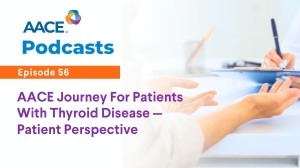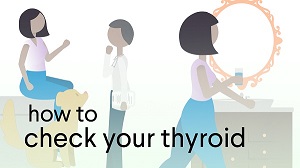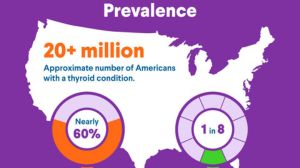Hashimoto's Disease Treatment
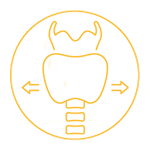
Hashimoto's Disease Treatment
How is Hashimoto's disease treated?
If you have hypothyroidism as a result of Hashimoto’s disease, thyroid hormone therapy is needed since proper dosage usually corrects any symptoms due to thyroid hormone deficiency. Thyroid hormone therapy is not needed if the thyroid is functioning normally, since it doesn’t help with symptoms in that setting.
Treatment of hypothyroidism caused by Hashimoto’s disease generally consists of taking a single daily tablet of levothyroxine. It is essential to take this medication as prescribed each day. Older patients who may have underlying heart disease are usually started on a low dose of levothyroxine that is gradually increased, while younger, healthy patients can be started on a full dose right away if the blood work shows that it’s necessary.
Your health care professional will need to precisely adjust your hormone dosage based on lab tests, since the body is sensitive to even small changes in thyroid hormone levels.
- If the dose is too low, the thyroid gland may enlarge, and symptoms of hypothyroidism will continue. This may cause increased serum cholesterol levels, possibly increasing the risk for atherosclerosis and heart disease.
- If the dose is too strong, it can cause symptoms of hyperthyroidism, creating excessive strain on the heart and an increased risk of developing osteoporosis.
While your symptoms may improve within a week, the full impact of thyroid medicine usually takes time. For example, skin changes may take up to 3-6 months to resolve. Because hypothyroidism due to Hashimoto’s disease is usually permanent, lifelong treatment is generally needed. The dosage of treatments may have to be adjusted from time to time.
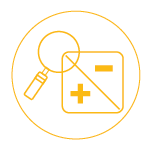 Treatment Monitoring
Treatment Monitoring
How is your Hashimoto’s treatment monitored?
If you start taking levothyroxine thyroid hormone medication for Hashimoto’s disease, your doctor will schedule regular blood tests to check on whether the dose you’ve been prescribed is right for you. Different people need different amounts of thyroid hormone, so determining your own personal just-right daily dose often requires monitoring and adjustment.
Your doctor monitors your thyroid treatment by performing blood tests to measure the amount of TSH and T4 in your blood. Generally, doctors recommend blood tests about 6-8 weeks after you begin taking levothyroxine for Hashimoto’s. If your doctor needs to adjust your dose, they typically recommend another round of blood testing 6-8 weeks later. Don’t be surprised if you need several dose adjustments to get to the right levothyroxine dose — that’s not unusual.
Once your doctor settles on a dose that brings your TSH and T4 into the normal range, they will likely recommend follow-up blood testing every 6-12 months to make sure your dosage stays on track long-term.
What can you do to monitor your Hashimoto’s treatment?
Blood tests can determine whether your levothyroxine dose is right for you. However, symptoms can also indicate whether your dosage is too high or too low. Let your doctor know if you start experiencing any of following side effects:
- Bowel movement changes (diarrhea or constipation)
- Changes in energy levels, sleep habits, or tiredness
- Changes in heart rate, including a pounding heart
- Feeling unusually cold or warm
- Feelings of depression, anxiety, or irritability
- Menstrual changes
- Muscle aches or weakness
- Nervousness, jumpiness, or shakiness
- Unexplained weight changes
- Puffiness, especially of the face, hands, and/or feet
 Treatment Adjustment
Treatment Adjustment
Why does Hashimoto’s treatment need to be adjusted?
If you have Hashimoto’s disease, your health care professional uses several pieces of information to decide if levothyroxine is necessary, and if so, what levothyroxine dose to start you with. These may include your age, weight, symptoms, other health conditions you may have (such as heart disease), and the results of blood tests that measure the thyroid hormones TSH and T4.
Levothyroxine doses for Hashimoto’s can range from 25 to 300 micrograms (mcg) per day. However, most healthy, normal-weight adults need about 100-125 mcg daily.
Although initial dosages vary, most health care professionals start Hashimoto’s patients at 25 to 75 mcg of levothyroxine per day. To help reduce the risk of treatment-related complications, your health care professional may start you on a lower dose (12.5 to 25 mcg a day) if you are over age 50 or have certain types of cardiac disease or other health concerns.
Once your health care professional decides on a starting dose, you’ll take it for 6-8 weeks and then get repeat blood work. Then, if blood tests show that you need more or less levothyroxine, your health care professional will adjusts your dose, usually by 12.5 - 25 mcg daily.
 Complications of Hashimoto’s Treatments
Complications of Hashimoto’s Treatments
Your thyroid plays a role in a wide range of bodily functions, so taking too much or too little levothyroxine can affect you in many ways. To start with, an incorrect dose of levothyroxine can aggravate your symptoms, from weight changes to sleep disturbances.
Too-high or too-low doses of levothyroxine can also raise your risk of other treatment-related complications. By monitoring and adjusting your dosage, your doctor can help lower your chances of developing complications, such as:
- Reduced bone density or osteoporosis, especially in women
- Angina (reduced blood flow to the heart)
- Arrhythmias (heart rhythm disorders)
- Atrial fibrillation (the most common type of arrhythmia)
- Poor blood flow through the coronary arteries
- Thickening of the heart walls





 DOWNLOAD
DOWNLOAD
